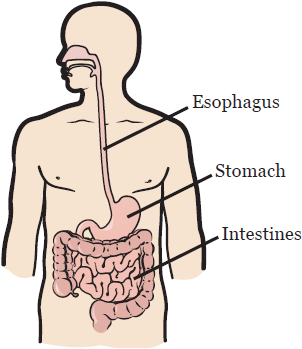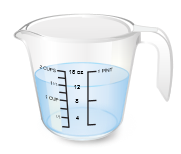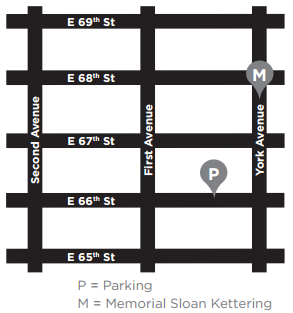This information will help you get ready for your upper gastrointestinal (GI) series at Memorial Sloan Kettering (MSK).
About Your GI Tract
Your gastrointestinal (GI) tract is the path that food takes through your body. Your esophagus, stomach, and intestines are part of your GI tract (see Figure 1). Your esophagus is a tube that carries food and liquid from your mouth to your stomach.

About Your Upper GI Series
An upper GI series is a test where your radiologist takes a series of X-ray images to look at your esophagus, stomach, and part of your small intestine. A radiologist is a doctor with special training in image-guided procedures.
An upper GI series helps us learn why you’re having symptoms, including:
- Trouble swallowing
- Burping
- Heartburn
- Stomach pain
- Throwing up
- Weight loss
1 Week Before Your Procedure
Ask about your medications
You may need to stop taking some of your medications before your procedure. Talk with your healthcare provider about which medications are safe for you to stop taking.
Medications for diabetes
You may take insulin or other medications for diabetes. Ask the healthcare provider who prescribes the medication what you should do the morning of your procedure. You may need to change the dose before your procedure.
Contrast dye
You will get contrast dye during your procedure. Contrast is a special dye used to make it easier for your radiologist to see differences in the organs in your body.
There are different types of contrast used for imaging studies. The contrast used for an upper GI series is barium, a white, chalk-like liquid, or iohexol (Omnipaque®), a clear liquid. Your radiologist will let you know which type of contrast dye you will have take and how to take it.
If you’ve had a reaction to contrast in the past, tell your radiologist or healthcare provider.
The Day Before Your Procedure
You can eat dinner the night before your procedure.
Instructions for eating and drinking before your procedure

- Do not eat anything after midnight the night before your procedure. This includes hard candy and gum.
- Between midnight and up until 2 hours before your scheduled arrival time, you may drink a total of 12 ounces of water (see figure).
- Starting 2 hours before your scheduled arrival time, do not eat or drink anything. This includes water.
The Day of Your Procedure
Things to remember
- Take the medications you were instructed to take the morning of your procedure. Take them with a few sips of water. If you will need to take any medication after your procedure, bring it with you to the hospital.
- Remove any jewelry, including body piercings.
- If you wear contact lenses, wear your glasses instead, if possible. If you don’t have glasses, please bring a case for your contacts.
What to bring
- A list of the medications you take at home, including patches and creams.
- Medications for breathing problems (such as inhalers).
- Medications for chest pain.
- Any medications that you will need to take after your procedure.
Where to park

MSK’s parking garage is located on East 66th Street between York and First Avenues. If you have questions about prices, call 212- 639-2338.
To reach the garage, turn onto East 66th Street from York Avenue. The garage is located about a quarter of a block in from York Avenue, on the right-hand (north) side of the street. There is a pedestrian tunnel that you can walk through that connects the garage to the hospital.
There are also other garages located on East 69th Street between First and Second Avenues, East 67th Street between York and First Avenues, and East 65th Street between First and Second Avenues.
Where to go
You will have your procedure at 425 East 67th Street between First and York Avenues. This is a side entrance of the main MSK building. Take the A elevator to the 2nd floor.
What to expect
Once you arrive at the hospital, doctors, nurses, and other staff members will ask you to state and spell your name and date of birth many times. This is for your safety. People with the same or similar name may be having procedures on the same day.
You will change into a hospital gown and remove all your jewelry and dentures. Your radiologist will review the procedure with you and answer your questions. You will get contrast dye. This will be barium or iohexol (Omnipaque), depending on the reason for your test. Your radiologist will tell you when and how much of it to drink.
You will be helped onto the X-ray table and helped to lie flat on your back. The X-ray lets your radiologist watch the contrast dye move through your esophagus, stomach, and small intestine. We may ask you to change positions or stand, if you can. This will help the contrast dye cover your intestines.
Your technologist will take X-rays throughout your test. You may need to drink extra contrast dye depending on the reason for your test. You will wait until the contrast dye has reached the area of your body your radiologist needs to examine. Then, your technologist will take more X-rays, 30 minutes apart.
Once your radiologist has reviewed all of the X-rays, you can leave.
Your procedure will take 1 to 5 hours. Sometimes, more X-rays are needed 12 or 24 hours later. Your radiologist will tell you If you need more X-rays.
After Your Procedure
You can go back to your usual diet and activities unless your healthcare provider gives you other instructions.
If you drank barium, your bowel movements (poop) will be white for the next few days as your body gets rid of the barium. Barium can cause constipation, so drink extra liquids to help move it out of your intestine. Constipation is when you have fewer bowel movements than what’s normal for you.
If your bowel movements are not back to normal a few days after your procedure, call your healthcare provider. You may need to take a laxative, such as milk of magnesia or an enema, to remove all of the barium. A laxative is medication to help you have a bowel movement.
Your results
If you are not in the the hospital (an outpatient), you can see your test results in MyMSK, our patient portal. They will be in your account in about 2 days. You also can call your healthcare provider’s office to ask about your results.
If you’re in the hospital (an inpatient), your results will be available the same day as your procedure. You can get the results from any healthcare provider that’s treating you.
Contact Information
If you have any questions or concerns, please talk with your doctor, nurse, or another member of your healthcare team at the Department of Radiology. You can reach them Monday through Friday from to at 212-639-7298.
After , during the weekend, and on holidays, please call 212-639-2000. Ask for the doctor on call for your doctor.